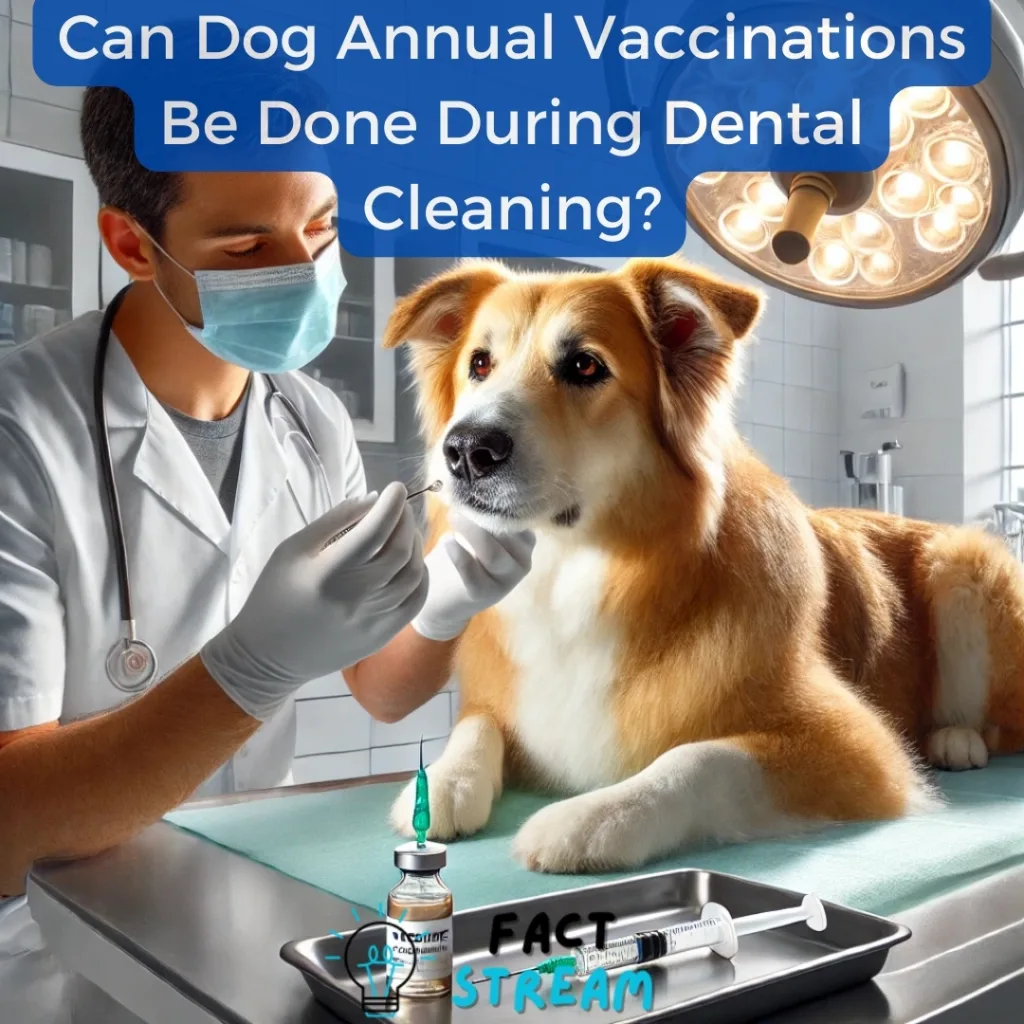Can Dog Annual Vaccinations Be Done During Dental Cleaning?
As a loving pet owner, you know that keeping your dog up-to-date on vaccinations and dental care is essential. It’s natural to wonder if it’s possible to combine their annual vaccinations with their dental cleaning. This would certainly save you a trip to the vet, but it’s not always the best approach for your furry friend’s health.
Why Combining Might Not Be Ideal?
While combining annual vaccinations with dental cleaning might seem convenient, your vet might advise against it for several reasons. Here’s why:
- Anesthesia and Immune Response: Most dental cleanings require anesthesia so your dog stays comfortable and still during the procedure. However, anesthesia can temporarily suppress the immune system, which may impact how well the vaccine works. Think of it like this: the vaccine is like a training exercise for your dog’s immune system. Anesthesia might make it a little harder for them to learn and remember how to fight off those diseases.
- Difficulty Identifying Reactions: If your dog experiences any side effects after the combined procedures, it can be tricky to pinpoint the cause. Was it the vaccine, the anesthesia, or the dental cleaning itself? This makes it harder for your vet to provide the right care. It’s like trying to solve a mystery with too many suspects!
- Increased Stress and Discomfort: Both vaccines and anesthesia can sometimes cause mild side effects like soreness, fatigue, or a slight fever. Combining procedures might amplify these side effects, making your dog feel more uncomfortable and potentially slowing down their recovery.
- Potential for Delayed Recovery: If your dog isn’t feeling their best after the combined procedures, it might take them a bit longer to bounce back to their usual playful self. Separating the appointments can help make their recovery smoother and more comfortable.
Why Dental Cleanings Are Important?
Dental cleanings are much more than just a cosmetic procedure for your dog. They are a vital part of maintaining their overall health.
- Pain Prevention: Dental disease can be incredibly painful for dogs, but they often can’t tell us when they’re hurting. Regular dental cleanings help prevent conditions like gingivitis (inflammation of the gums) and periodontal disease (a serious gum infection that can damage the jawbone).
- Protecting Overall Health: Bacteria from untreated dental disease can enter the bloodstream and travel to other organs, causing problems in the heart, kidneys, and liver. Regular dental cleanings help reduce the risk of these systemic illnesses.
- Improving Quality of Life: When your dog’s mouth is healthy and pain-free, they can eat, play, and enjoy life to the fullest. Dental cleanings, especially for senior dogs, can significantly improve their quality of life.
What Happens During a Dental Cleaning?
To understand the potential risks of dental cleaning, it’s helpful to know what the procedure involves:
- Anesthesia: General anesthesia is typically used to ensure your dog is comfortable and still during the cleaning. This allows the veterinarian to perform a thorough exam and cleaning without causing your dog stress or pain.
- Oral Exam: The veterinarian will examine your dog’s mouth, teeth, and gums, looking for signs of disease, infection, or other issues.
- Scaling and Polishing: Using special tools, the vet will remove plaque and tartar buildup from the teeth. Plaque is a sticky film that forms on teeth, while tartar is hardened plaque. Both can lead to dental problems if not removed.
- Extractions: If any teeth are severely damaged or diseased, the vet might need to extract them to prevent further complications.
- Fluoride Treatment/Sealant: Some vets apply fluoride or dental sealant to strengthen the teeth and protect them from future plaque buildup.
Recovery and Aftercare
After the dental cleaning, your dog might feel a little groggy or disoriented from the anesthesia. They might also experience some soreness, especially if they had any teeth extracted. Here’s how to help them recover comfortably:
- Rest and Hydration: Make sure your dog has a quiet place to rest and plenty of fresh water to drink.
- Soft Food: Feed your dog soft food for a few days after the procedure. This is gentler on their gums and any healing extraction sites.
- Avoid Hard Chews: Skip the hard chews and treats until their mouth has healed completely. You don’t want to irritate their gums or cause any discomfort.
- Follow Vet’s Instructions: Your vet will give you specific instructions on how to care for your dog after the cleaning, including any medications they might need. Be sure to follow their guidance carefully.
Talk to Your Vet to Make the Best Decision
While combining annual vaccinations with dental cleanings might be possible for some dogs, it’s crucial to consult with your vet. They will consider your dog’s individual health, age, and potential risk factors.
Your vet can help you determine the best timing and approach for vaccinations and dental cleanings to ensure your dog receives the safest and most effective care. They might recommend separating the appointments or suggest alternative options like sedation for the dental cleaning if it’s more appropriate for your dog. Remember, your vet is your partner in keeping your furry friend healthy and happy!


